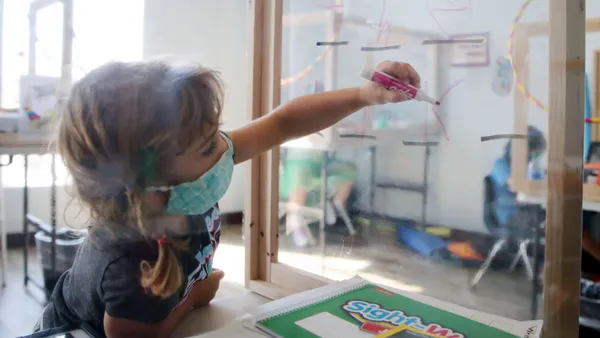Dive Brief:
-
The COVID-19 pandemic has fast-tracked proposals by the National Assessment Governing Board to rethink the way it administers assessments, said Lesley Muldoon, executive director of NAGB, on Thursday during the first of two segments of a quarterly board meeting. Proposals include linking National Assessment of Education Progress assessments with local and state tests, as well as with formative assessments.
-
Linking NAEP with other assessments is a request National Center for Education Statistics Commissioner Peggy Carr said she has heard from multiple school districts. “We have some messaging challenges that I’m picking up, and we also have some challenges around how to make our activities more relevant and have more utility for those stakeholders with boots on the ground,” Carr said.
-
Other innovations floated by the commissioner and others during the meeting include increasing diagnostic reporting around equity issues, offering remote proctoring especially for virtual or homeschooled students, and including aspects that aren’t traditionally assessed like career and technical education.
Dive Insight:
Carr said multiple education leaders have told her that NAEP, known as the Nation’s Report Card, needs to be more reflective of what’s taught and experienced in classrooms.
“‘We could see more utility out of what you're doing. We want to support you, but you need to help us, too,’ is what I heard,” said Carr about conversations she’s had with district and state leaders. Many on the governing board agreed on the importance of linking and contextualizing test scores.
"Linking local assessments to NAEP could be useful given how uneven state testing was the last couple of years, but I wonder whether doing so might be misleading," said Dale Chu, assessment expert and independent education consultant, in an email. Chu added that state assessments differ across the nation in terms of content, score scales, and proficiency threshold levels. "In short, policymakers would need to figure out what their tolerance is for imprecision in making such linkages."
The comments from the commissioner and others at the meeting come after NCES, the arm of the U.S. Department of Education that administers NAEP, said it was consulting with state and district leaders on how to best administer the test during the pandemic. Nationwide assessments were postponed until 2022.
The pandemic has also brought into question the need for — and the role of — high-stakes and standardized testing. Especially with the social-emotional impact of COVID-19 on students, some experts voiced concerns testing would only exacerbate student and teacher stress.
Many states, for example, continued to ask for another round of waivers on state assessments even after former U.S. Secretary of Education Betsy DeVos said testing would resume. And although the Department of Education under President Joe Biden also required the administering of state assessments, many states were afforded significant flexibilities around factors like participation rates.
Those in favor of testing say it's necessary especially at a time when students have fallen behind and achievement gaps have widened. Still, they acknowledge assessments must be more equitable, more contextualized and better utilized.
“NAEP is kind of like getting the final score in a sporting event … I know there’s more to the story,” said Patrick Kelly, a member of the board, during Thursday’s meeting.
“We’re uniquely positioned to tell some of those stories through contextual data and through some of the other elements we bring that state assessments just don't,” said Kelley, who teaches AP U.S. Government and Politics at Blythewood High School in Richland School District Two outside Columbia, South Carolina.
Others echoed that sentiment. “Unless what we actually produced is utilized, it becomes artifice,” said Ron Reynolds, executive director of the California Association of Private School Organizations.
“We’ve had a well-oiled machine that’s been in place for a while now,” Carr concluded in the conversation. “I think we have reached a crossroad. We can continue to travel the path that we’ve been on for so long because we know how to do it and we feel real comfortable, but we can take the road less traveled — that’s where I think we are.”














